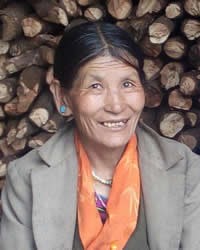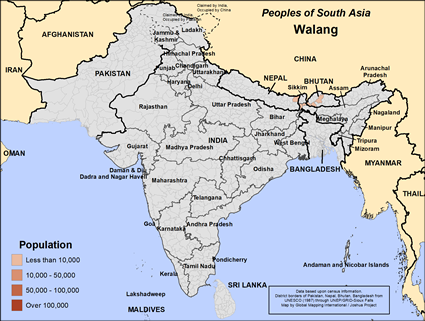Walung people (who are also known as Olangchung, Walungchung, Holung and Walungge) live in the northern part of the Taplejung District of Mechi Zone in far eastern Nepal. They inhabit about a dozen villages. One source notes: 'The upper Tamur in Taplejung District has a number of Bhotia [Tibetan] settlements. The largest is Walungchung, once a flourishing gola (mart) for transaction of goods between Tibet and Darjeeling.' The Walang are believed to have migrated south from Tibet several hundred years ago, before settling in their present location. Their language has evolved over the years. For generations the Walang dominated trade in this part of Nepal, earning their livelihoods as middlemen on the route between Tibet and India.
Today some are still traders, but most engage in agriculture.
Tibetan Buddhism is the religion of almost all Walang people. The main village of Walungchung has a large monastery that was built more than 200 years ago. Monks from Lhasa were often invited to come down to the Walang area to reside at the monastery. The people adhere to Buddhism and their chief deity at the Walungchung gompa is Chenrezi.
The Walang are a desperately needy unreached people group. Few have ever been exposed to the gospel in a meaningful way that would allow them to intelligently accept or reject Christ. In 1958 the first four Walang boys attended a missionary school in Darjeeling, but the Walang homeland in Nepal and Bhutan remains a spiritually barren land.
Pray for the authority of Christ to bind hindering spiritual forces and lead them to the Light of the World.
Pray for signs and wonders among the Walang people and for great breakthroughs with a rapid multiplication of disciples and house churches.
Pray for bold workers who are driven by the love of the Holy Spirit to go to them.
Scripture Prayers for the Walang in Bhutan.
Peoples of the Buddhist World, Asia Harvest, Copyrighted © Used with permission
| Profile Source: Joshua Project |











